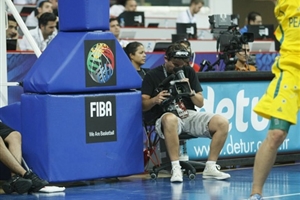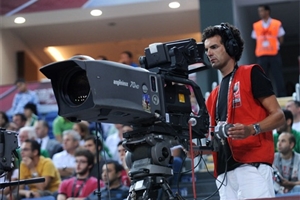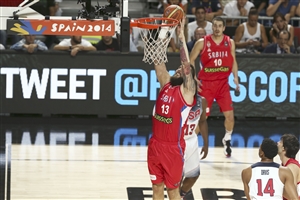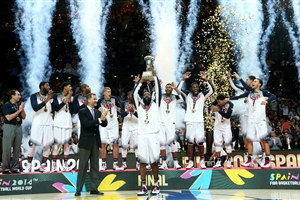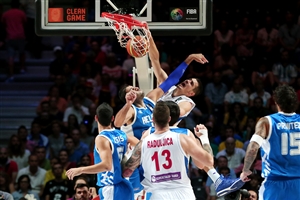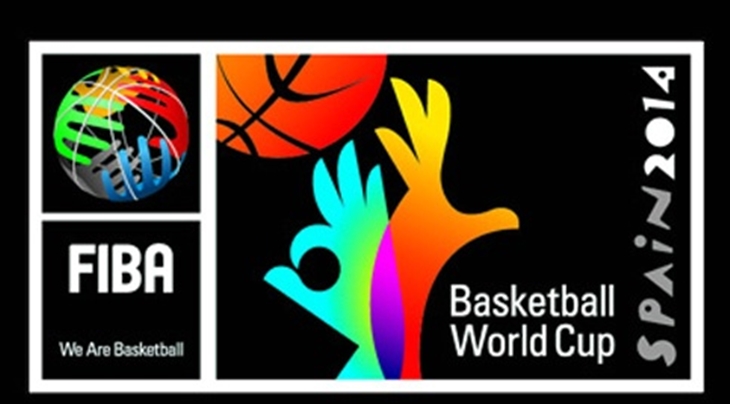
PR N°1 - FIBA Basketball World Cup officially launched in Madrid
MADRID, Spain (2014 FIBA Basketball World Cup) – The International Basketball Federation (FIBA) on Thursday officially launched the 2014 edition of its flagship tournament by revealing its brand new name, the FIBA Basketball World Cup, at a special event in the Spanish capital.
There was a distinct national flavour to the evening as the logo of the FIBA Basketball World Cup was unveiled and the Spanish Basketball Federation (FEB) formally presented the six host cities – Madrid, Barcelona, Bilbao, Seville, Granada and Las Palmas de Gran Canaria.
FIBA Secretary General Patrick Baumann explained the thinking behind the name change of the biggest international basketball tournament from ‘FIBA World Championship’ to ‘FIBA Basketball World Cup’ in front of the more than 400 guests which included eminent members of Spanish society, political institutions and the business world.
“The new name is short and catchy. The term ‘World Cup’ is known by people all over the globe and resonates in different languages: Copa del Mundo, Coppa del Mondo, Coupe du Monde,” he said.
“This new name reflects the prestige that our tournament has as a premier international competition and allows for it to be recognised as what it truly is: one of the biggest global sporting events, along with the FIFA World Cup, the Rugby World Cup and the Cricket World Cup.”
The logo for the 2014 FIBA Basketball World Cup was unveiled with a special contemporary Spanish ballet performance. It is inspired by the concept of “the basketball dance”. Two hands, symbolising the body part most directly involved in both basketball and Spanish dance, create a dynamic graphic that blends expressive gestures. The colourful design – inspired by the palette of colours found in the FIBA logo – pays tribute to Spanish artist Pablo Picasso.
José Luis Sáez, the President of the Spanish Basketball Federation, provided in-depth information on the six host cities and venues before the event concluded with the impressive unveiling of the logo.
“Our commitment and desire is to organise the FIBA Basketball World Cup for everyone. The best way to do that is by giving it a global dimension which, starting in September 2014, will become a true legacy for the whole society,” he said.
“That is why we want to come out of the 2014 FIBA Basketball World Cup with Spain as a platform for the promotion of basketball and the transmission of its great values as a sport, a focus of economic activity and a tool for social transformation.”
FIBA President Yvan Mainini thanked the Spanish Basketball Federation for its hospitality and said the huge turnout of dignitaries – which included greats Oscar Schmidt, Dino Meneghin and Juan Antonio San Epifanio – reflected just how highly-regarded the tournament is in Spain and all around the world.
“It’s a huge honour to have with us three of the biggest legends in international basketball. These men are symbolic with world class basketball. Having them here and so many others confirms that we made a good choice in attributing the 2014 FIBA Basketball World Cup to Spain,” he said.
You can find high resolution images of the 2014 FIBA Basketball World Cup logo as well as photos of the event on photos.fiba.com (username: public; password: gallery) and www.feb.es.
Go to www.fiba.basketball/worldcup for all the latest on the 2014 FIBA Basketball World Cup including information on the host cities and venues and history of the tournament.
###
Contacts
FIBA: Patrick Koller, +41 79 617 86 92 | koller@fiba.com
FEB: Vicente Azpitarte, +34 607 41 64 00 | vazpitartep@feb.es
About the FIBA Basketball World Cup
Known as the FIBA World Championship from 1950 until 2010, the FIBA Basketball World Cup is the flagship event of the International Basketball Federation.
The first-ever FIBA Basketball World Cup took place in Argentina in 1950 with the host nation prevailing in the final against the USA.
Since the first staging of the tournament in Buenos Aires where six teams did battle, the field has grown exponentially to feature the 24 best teams from around the world.
Yugoslavia have won gold in five of the 16 editions of the FIBA Basketball World Cup, while the USA account for four and the Soviet Union for three.
Since 1998, the winners of the FIBA Basketball World Cup get to celebrate their crowning moment by holding aloft the Naismith Trophy, named after the inventor of basketball, Dr James Naismith.
The FIBA Basketball World Cup has been the centre stage for some of international basketball’s biggest stars – from Oscar Schmidt and Nikos Galis to Pau Gasol and Kevin Durant and many in between.
